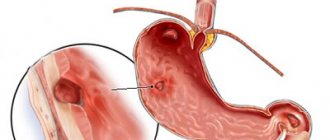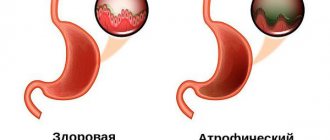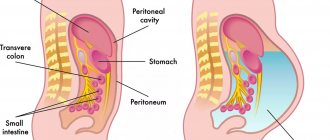Autoimmune gastritis
Autoimmune gastritis (type A, fundic or atrophic) is inflammatory-dystrophic changes in the mucous layer of the stomach of autoimmune origin. Usually the body and bottom of the organ, i.e. the fundus, are involved in the process. The disease is rare, occurring in approximately 10% of all people with various forms of gastritis.
The causes of this pathology have not been established with sufficient accuracy, but most experts consider genetic predisposition to be the main cause.
In addition, the following factors can trigger the development of the disease:
- presence of bad habits;
- frequent overeating;
- eating spicy, coarse, too hot or cold foods;
- disruptions in the gastrointestinal tract and endocrine disorders;
- weakened immunity;
- the presence in the patient’s medical history of various inflammatory and infectious diseases;
- prolonged stress.
Autoimmune gastritis is divided into 2 types:
- Autoimmune atrophic gastritis. Leads to a decrease in the acidity of gastric juice, decreased motility and a deterioration in the process of digesting food. This form can provoke the development of malignant formation.
- Chronic autoimmune gastritis. With this form, specific antibodies are produced to the protein that absorbs vit. B12 from consumed food, and gastromucoprotein, which creates stomach protection. Subsequently, this can lead to polyhypovitaminosis, anemia, and adenocarcinoma.
Autoimmune gastritis most often occurs in a chronic form, accompanied by disorders of the endocrine system, most often autoimmune thyroiditis.
Symptoms
Almost all types of gastritis manifest themselves after eating. After eating food, the patient at the initial stage may be bothered by the following symptoms from the digestive system:
- diarrhea or constipation;
- rotten taste in the mouth;
- gas formation;
- nausea;
- belching;
- frequent heartburn;
- discomfort and pain in the stomach.
These manifestations are associated with stagnation of food in the gastrointestinal tract due to poor digestion of food. In addition to these symptoms, at the stage of exacerbation, a patient with autoimmune gastritis may additionally be bothered by general ailments:
- sleep problems;
- headache;
- decreased blood pressure;
- unexplained irritability;
- weakness;
- dizziness;
- sudden weight loss;
- poor appetite;
- sweating, which increases after eating;
- dry skin, paleness;
- the appearance of pigmented spots;
- coating on the tongue.
An insufficient amount of absorbed vitamins during autoimmune gastritis gives rise to a deterioration in the functioning of various body systems, leading, for example, to dermatitis and decreased vision.
However, it is not these classical manifestations that allow one to suspect autoimmune gastritis in a patient, but the symptoms of B12-deficiency anemia, which occur in 50% of cases:
- pale skin with a slight jaundiced tint
- general weakness, fatigue
- dizziness, tinnitus
- inflammation of the tongue, which increases in size, becomes red with a glossy surface
- spinal cord damage.
Diagnostic features
The main diagnostic methods to establish the diagnosis of autoimmune gastritis are: Fibrogastroduodenoscopy (FGDS) with collection of biopsy material and gastric contents. This is necessary to assess the cellular composition of the gastric mucosa and determine the type of secretion.
- A complete blood count helps identify signs of B12 deficiency anemia. These include a decrease in the amount of hemoglobin and red blood cells, an increase in red blood cells in volume, and a change in their shape.
- Biochemical blood test , including determination of the concentration of gastrin in the serum. It increases with autoimmune inflammation.
- An immunological blood test can detect antibodies to the body’s own tissues and to herpes viruses.
- Polymerase chain reaction (PCR) is also needed to detect latent viral infection.
Treatment
A mandatory element in the treatment of autoimmune gastritis is dietary nutrition. Food should be gentle on the inflamed mucosa, not irritate and not provoke the production of hydrochloric acid.
The following medications are used for therapeutic purposes:
- Antibacterial drugs , which are prescribed as part of combination therapy and are used to eradicate Helicobacter pylori infection.
- Antispasmodic medications. They help relieve pain.
- Enzymes as replacement treatment. Such drugs are used to compensate for the poor secretory function of the organ.
- Bismuth preparations have a beneficial effect on the inflamed gastric mucosa and promote its restoration.
- Corticosteroids. These medications are used for active and rapid progression of the disease. They allow you to weaken the body's immune system to block the production of antibodies against the digestive system.
- Antihistaminesprescribed in the initial stages of pathology and help reduce gastric secretion (Ranitidine).
- Medicines that stimulate the production of gastric juice and relieve inflammation (Plantaglucid).
- Vitamin complexes and folic acid. Prescribed to eliminate symptoms of vitamin deficiency, treat iron deficiency and B12 deficiency anemia.
Department of Occupational Pathology and Allergology, physician-therapist at the health center Lazovskaya Marina Andreevna
Gastritis is a group of diseases whose common feature is inflammation of the gastric mucosa.
This is most often due to an infection caused by the bacterium Helicobacter pylori, which also causes stomach ulcers. Alcohol abuse or long-term use of painkillers can contribute to the development of gastritis.
Gastritis can occur suddenly and resolve quickly (acute gastritis) or develop gradually and persist for a long time (chronic gastritis). In rare cases, it leads to ulcers and is a factor that increases the risk of stomach cancer. However, it is usually asymptomatic and does not require treatment.
Synonyms Russian
Acute gastritis, chronic gastritis.
English synonyms
Chronic gastritis, acute gastritis.
Symptoms
Chronic gastritis is most often asymptomatic, but sometimes it manifests itself as follows:
- pain or discomfort in the upper abdomen,
- nausea, vomiting,
- burning or aching pain in the upper abdomen, heaviness, bloating,
- feeling of fullness in the abdomen, rapid satiety.
In most cases, these symptoms should be regarded as manifestations of functional dyspepsia in the absence of organic diseases of the gastrointestinal tract.
Acute gastritis is usually accompanied by severe abdominal pain, nausea and vomiting.
General information about the disease
Gastritis is a group of diseases whose common feature is inflammation of the gastric mucosa.
The stomach is an organ in the form of a muscular sac located in the upper abdomen behind the lower ribs. It serves as a “reservoir” for incoming food and produces juice for its digestion.
Gastritis occurs when there is an imbalance between the effects of hydrochloric acid and mucosal protective factors. This occurs due to various reasons: the presence of bacteria and the toxins they produce, alcohol intake, painkillers. As a result, inflammation of the gastric mucosa develops.
Gastritis can be acute or chronic.
1. Acute gastritis is a rapidly developing inflammation that resolves over a short period of time. Most often it is caused by infection with the bacterium Helicobacter pylori and is asymptomatic, sometimes becoming chronic.
Also a common cause of acute gastritis is the consumption of large amounts of alcohol, abuse of painkillers (aspirin, ibuprofen, etc.).
2. Chronic gastritis develops gradually. It affects about 80-90% of the adult population.
Chronic gastritis is characterized by inflammation of the gastric mucosa at the cellular level, which can only be determined under a microscope. Over time, the mucous membrane becomes thinner (atrophies), as a result of which the production of gastric juice decreases.
There are two main forms of chronic gastritis.
1. Gastritis caused by the bacterium Helicobacter pylori (95% of all cases of chronic gastritis). Once in the stomach, it contributes to the development of chronic inflammation, eventually leading to thinning of the mucous membrane. However, for most people, the Helicobacter bacteria does not cause any symptoms.
2. Autoimmune gastritis. Its development is associated with autoimmune mechanisms. In this case, the body produces antibodies to its own cells of the gastric mucosa, which leads to their damage. As a result, the production of hydrochloric acid decreases and the gastric mucosa becomes thinner.
In a healthy body, the gastric mucosa produces a protein necessary for the absorption of vitamin B12, which plays an important role in the formation of red blood cells. With a lack of B12, B12 deficiency anemia develops.
Autoimmune gastritis develops very slowly and is usually detected in old age.
Who is at risk?
- More than half of the world's population is infected with the bacterium Helicobacter pylori.
It should be noted that this bacterium is only one of the causes of gastritis; additional factors are often decisive: smoking, drinking alcohol, painkillers.
- Those who regularly use painkillers: aspirin, analgin, Nise, ibuprofen, etc.
- Alcohol abusers.
- Those who have suffered severe stress, for example, after operations, injuries, burns and severe infections.
- Patients with autoimmune diseases such as B12 deficiency anemia, inflammatory bowel disease, autoimmune thyroiditis.
Diagnostics
The diagnosis of “chronic gastritis” can only be made based on the results of examining a piece of the gastric mucosa under a microscope.
Since the most common cause of gastritis is the bacterium Helicobacter pylori, its presence in the body is first determined.
Detection of Helicobacter pylori infection
- Helicobacter pylori, IgA, Helicobacter pylori, IgG – detection of antibodies to this bacterium. The results of this study are highly reliable, but it is not used to evaluate the effectiveness of treatment, since antibodies to Helicobacter pylori persist for a long time after getting rid of it.
- Helicobacter pylori, DNA, – determination of bacterial DNA in stool.
- Breath urease test. This test is highly sensitive and specific. Helicobacter pylori produces a lot of urease (a special enzyme) during its life. During the test, the subject drinks a liquid containing radioactive carbon. Helicobacter breaks down the substances contained in the liquid, forming carbon dioxide exhaled by a person. Accordingly, the presence of labeled carbon in exhaled carbon dioxide indicates that a person is infected with the Helicobacter bacterium.
A negative test result for Helicobacter may indicate that the person is not infected. If additional symptoms occur, endoscopy is prescribed.
- Endoscopy (FGDS - fibrogastroduodenoscopy). A hollow tube equipped with a lens is inserted through the esophagus into the stomach. During FGDS, a biopsy is performed - taking pieces of tissue from the gastric mucosa for subsequent study, during which Helicobacter can be identified, in addition, the nature of inflammation and the type of gastritis can be determined.
Tests confirming the diagnosis of autoimmune gastritis
- General blood analysis. For gastritis caused by Helicobacter pylori, changes in the general blood test are not typical. With autoimmune gastritis associated with B12-deficiency anemia, the hemoglobin level may be reduced, the mean erythrocyte volume (MCV) may be increased, and the hemoglobin content in the erythrocyte (MCI) may be increased.
- Pepsinogen I, pepsinogen II. Pepsinogen is produced by cells of the gastric mucosa. A decrease in its level indicates atrophy (thinning) of the gastric mucosa, which is typical for advanced cases of chronic gastritis.
- Gastrin is a hormone produced by stomach cells to stimulate the production of gastric juice by mucosal cells. With autoimmune gastritis, its concentration increases significantly.
- Antibodies to gastric parietal cells. In autoimmune diseases, antibodies to parietal cells damage the gastric mucosa. Their level almost always increases in autoimmune gastritis.
- Vitamin B12. Reduced levels of vitamin B12 in the blood indicate B12 deficiency anemia associated with autoimmune gastritis.
- Endoscopy (FGDS) with biopsy. When examining cells of the gastric mucosa under a microscope, changes characteristic of chronic autoimmune gastritis are revealed.
Treatment
Treatment for gastritis depends on its cause.
In case of acute gastritis caused by abuse of alcohol or painkillers, you must stop taking them.
Chronic gastritis caused by the Helicobacter bacterium is cured by destroying the bacterium in cases where:
- there are symptoms of the disease that cause discomfort,
- there is a hereditary predisposition to developing stomach cancer,
- the patient is forced to regularly take painkillers and anti-inflammatory drugs.
The bacterium is destroyed by a course of antibiotics within 10-14 days. To assess the success of therapy, a repeat test for the Helicobacter bacterium is necessary.
In most cases, treatment for gastritis also involves taking medications that reduce the production of hydrochloric acid and promote healing of the stomach lining.
Prevention
At the moment, no methods have been developed to prevent gastritis.
Recommended tests
- General blood analysis
- Helicobacter pylori, IgA (quantitative)
- Helicobacter pylori, IgG (quantitative)
- Helicobacter pylori, DNA [real-time PCR] (feces)
- Pepsinogen I
- Pepsinogen II
- Gastrin
- Antibodies to gastric parietal cells
- Vitamin B12 (cyanocobalamin)








